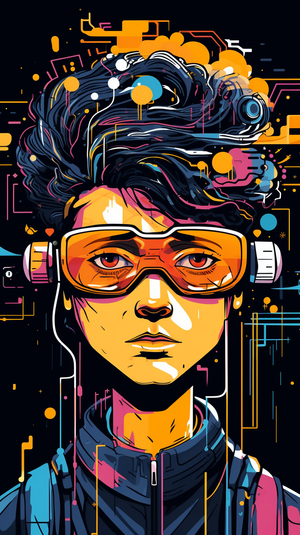The Weeknd's "💧😢": A 👻🪞 on 🙅♂️🛑 and 😔
Artist: The Weeknd
Album: After Hours (2020)
Charted: 🇬🇧 2 🇺🇸 1
The Weeknd's haunting ballad "Save Your Tears" has captivated audiences with its emotive lyric, "I don't know why I run away, I make you cry when I run away." The song delves into the theme of self-sabotage and the internal struggle faced by the protagonist as he grapples with the consequences of his actions. In this blog post, we explore the thought-provoking theme of the song and its portrayal of regret, vulnerability, and the complex emotions that come with introspection.
The Weeknd – Save Your Tears (Official Music Video)
The Struggle with Self-Sabotage
"Save Your Tears" portrays the inner turmoil of the protagonist, who finds himself consistently running away from meaningful connections, leaving his loved ones in tears. The lyric "I don't know why I run away" speaks to the struggle with self-sabotage and the difficulty in confronting and addressing one's emotional barriers.
The Cycle of Regret
The song's lyric, "I make you cry when I run away", depicts a cycle of regret and guilt that the protagonist experiences. His actions lead to pain and heartbreak for those he cares about, and yet, he finds himself repeating the same pattern of escape and avoidance.



The generative AI tool, Midjourney, visually interprets The Weeknd's "Save Your Tears." (3 Images)
Embracing Vulnerability
"Save Your Tears" is a powerful exploration of vulnerability. The Weeknd's emotive delivery and the rawness of the lyrics showcase the internal struggle of the protagonist, who recognizes the pain he causes but finds it challenging to break free from his self-destructive tendencies.
The Impact of Past Trauma
The song also alludes to the impact of past trauma on the protagonist's behavior. His inclination to run away may be rooted in past experiences that have left emotional scars, making it difficult for him to fully embrace love and connection.
A Reflection on Authenticity
"Save Your Tears" invites listeners to reflect on the importance of authenticity and the need to confront our inner struggles. The lyric's vulnerability serves as a reminder that true growth and healing come from acknowledging our shortcomings and working towards self-improvement.
An Empathetic Narrative
The Weeknd's lyric resonates with listeners who have grappled with similar internal conflicts and the fear of facing their own emotions. It presents an empathetic narrative that allows listeners to connect with the complexities of human emotions and the journey towards self-awareness.
A Soundtrack for Self-Discovery
"Save Your Tears" has become a soundtrack for self-discovery, offering solace to those on a path of introspection and healing. Its emotional depth and introspective themes make it a powerful anthem for those seeking to understand and confront their inner demons.
The Weeknd's "Save Your Tears" is a haunting ballad that delves into the theme of self-sabotage, vulnerability, and regret. Its lyric, "I don't know why I run away, I make you cry when I run away", portrays the protagonist's struggle with confronting his emotional barriers and the pain he inflicts on those he cares about. The song's introspective narrative invites listeners to reflect on their own journeys of self-discovery and the importance of authenticity in fostering meaningful connections.
So, the next time you hear "Save Your Tears," let it be a poignant reminder of the power of self-awareness and the courage required to face our own vulnerabilities and break free from self-destructive patterns.
💬 Dig Deeper—Jump into the discussion below
Music takes us on a journey—to places, people, feelings, and memories. It transcends borders, leads to spiritual awakenings, excites and soothes us, marks our celebrations and milestones, lulls us to sleep, and in some instances, even brings us to war.
As you explore the visual and textual interpretation of lyrics, we invite you to share your thoughts or consider one of these questions.
- Connecting With The Music: How does the song resonate with your personal experiences, when and where did you first hear them, and how do these connections alter your interpretation of the lyrics?
- Visualizing Lyrics: Are the images similar to what you imagined? Compare the AI-generated visuals with yours do you see harmony or dissonance, and what does this reveal about the song's subtext?
- Beyond Borders: We know that music has the power to transcend cultural, social, and geographical boundaries, but we want to hear from you about how it reflects specific cultural experiences or identities.
- Exploring Themes: What overarching themes do you extract from the song, and how do these themes mirror or challenge societal norms and beliefs?
- Songs and Stories: If this song was the soundtrack to a story or an event, what would it (the narrative) look like and why? Can we learn from it? Is it healing, empowering, or uniting?
Community Guidelines
🔗 Read the full Community Guidelines
- 😊🤝🎶 Be kind, be respectful. Remember, everyone's here for the love of music and AI. Let's keep the vibe positive.
- 🚫🗑️📣 No spamming, no offensive behavior. Let's keep our conversations meaningful and our community clean.
- 🗣️💬⛔ Express yourself, but remember, all types of harassment and hate speech have no place in our community.


